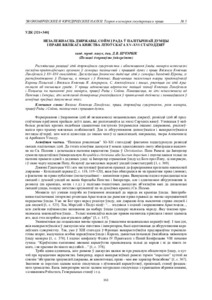Please use this identifier to cite or link to this item:
https://elib.psu.by/handle/123456789/17202Full metadata record
| DC Field | Value | Language |
|---|---|---|
| dc.contributor.author | Шчэрбік, Д. В. | - |
| dc.date.accessioned | 2016-09-21T13:17:42Z | - |
| dc.date.available | 2016-09-21T13:17:42Z | - |
| dc.date.issued | 2016 | - |
| dc.identifier.citation | Вестник Полоцкого государственного университета. Серия D, Экономические и юридические науки. - 2016. - № 5. – С. 161-165. | ru_RU |
| dc.identifier.issn | 2070-1632 | - |
| dc.identifier.uri | https://elib.psu.by/handle/123456789/17202 | - |
| dc.description | The Independent of State, the Sejm and Rada in Political Thought and Law in the Grand Duchy of Lithuania in the XV–XVI Centuries D. Shcherbik (Cand. Law. Sciences, Assoc. Polotsk State University) | ru_RU |
| dc.description.abstract | Раглядаецца развіццё ідэй дзяржаўнага суверэнітэта і абмежавання ўлады манарха шляхецкімі саслоўна-прадстаўнічымі органамі ў гісторыі палітычнай і прававой думкі і права Вялікага Княства Літоўскага ў XV–XVI стагоддзях. Даследуецца ўзнікненне дадзеных ідэй у гісторыі Заходняй Еўропы, іх распаўсюджванне ў Польшчы, а потым і ў Княстве. Вывучаюцца палемічныя творы прадстаўнікоў Кароны Польскай і Вялікага Княства Я. Астрарога, С. Ажэхоўскага і іншых, рэцэпцыя імі ідэй Арыстоцеля аб змешаным урадзе. У працы адзначаецца адрозненне пазіцый элітаў Княства Літоўскага і Польшчы па пытаннях ролі манарха, правоў Рады і Сойма. Паказваецца, як ідэі незалежнасці ад Папства і Імперыі, ідэі шляхецкай дэмакратыі рэалізоўваліcя ў практычнай дзейнасці і замацоўваліся ў асноўных праўных дакументах эпохі.= The article is devoted to the development of ideas of national sovereignty and the limits on the power of the monarch by gentry class-representative bodies in the history of political and legal thinking and law of the Grand Duchy of Lithuania in the XV–XVI centuries. The article examines the emergence of these ideas in the history of ideas in Western Europe, their distribution in Poland, and then in the Grand Duchy of Lithuania. This article explores the polemical works of the representatives of the Polish State and the Grand Duchy of Lithuania such as Jan Ostroróg, Stanisław Orzechowski and other, the reception of Aristotle's ideas on mixed government in their works. The article notes opposed positions of elites in Poland and in the Grand Duchy of Lithuania on the role of the monarch, the rights of the Sejm and Rada. Depicted as the idea of the state independence of the Papacy and the Empire, Golden Liberty, noble democracy have been implemented in practice and in the main legal documents of the period. | ru_RU |
| dc.language.iso | be | ru_RU |
| dc.publisher | Полоцкий государственный университет | ru_RU |
| dc.relation.ispartof | Веснік Полацкага дзяржаўнага ўніверсітэта. Серыя D, Эканамічныя і юрыдычныя навукі | be_BE |
| dc.relation.ispartof | Herald of Polotsk State University. Series D, Economics and law sciences | en_EN |
| dc.relation.ispartof | Вестник Полоцкого государственного университета. Серия D, Экономические и юридические науки | ru_RU |
| dc.relation.ispartofseries | Серия D, Экономические и юридические науки;2016. - № 5 | - |
| dc.rights | open access | ru_RU |
| dc.subject | Вялікае Княства Літоўскае | ru_RU |
| dc.subject | права | ru_RU |
| dc.subject | дзяржаўны суверэнітэт | ru_RU |
| dc.subject | роля манарха, правоў Рады і Сойма | ru_RU |
| dc.subject | палітычная і прававая думка. | ru_RU |
| dc.subject | Grand Duchy of Lithuania | ru_RU |
| dc.subject | the state sovereignty | ru_RU |
| dc.subject | the role of the monarch, the rights of Parliament and of the Sejm | ru_RU |
| dc.subject | political and legal thought | ru_RU |
| dc.title | Незалежнасць дзяржавы, сойм і рада ў палітычнай думцы і праве Вялікага Княства Літоўскага XV–XVI стагоддзяў | ru_RU |
| dc.type | Article | ru_RU |
| Appears in Collections: | 2016, № 5 | |
Files in This Item:
| File | Description | Size | Format | |
|---|---|---|---|---|
| 161-165.pdf | 166.65 kB | Adobe PDF |  View/Open |
Items in DSpace are protected by copyright, with all rights reserved, unless otherwise indicated.